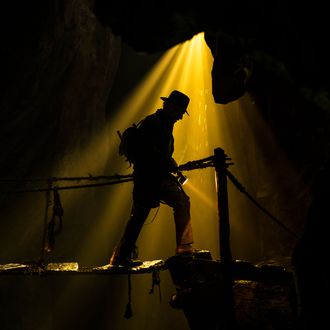
Indiana Jones and the Dial of Destiny promised a return to form to a young Harrison Ford. The latest film in the adventure franchise sees Jones (Ford) embark on a global, continent-spanning search for a device — and its various pieces scrambled across the world — built by Greek philosopher Archimedes that is said to manipulate the fissures of time. The issue? A former Nazi is also on the hunt for the time-travel contraption, named Antikythera, with the hopes of hopping back to World War II–era Germany and delivering the fascists the key to victory. Technology de-ages Ford in the opening chunk of the film before the time machine spits out the actor in his current form. “The damn thing is fun,” Vulture critic Bilge Ebiri writes. “Mangold may not have the young Spielberg’s musical flair for extravagant action choreography (who does?), but he is a tougher, leaner director, using a tighter frame and keeping his camera close.” Other critics disagree on the “fun” aspect. A different critic, writing for Variety, called the fifth installment a “dutifully eager but ultimately rather joyless piece of nostalgic hokum.” The first reviews following its Cannes premiere are mixed — here’s what critics have to say about Dial of Destiny.
“The damn thing is fun. Mangold may not have the young Spielberg’s musical flair for extravagant action choreography (who does?), but he is a tougher, leaner director, using a tighter frame and keeping his camera close. That may shortchange the escapist atmosphere and evocative exotica of the material (which is, after all, one of the pleasures of Indiana Jones movies), but it does bring a ground-level immediacy to the action.” —Bilge Ebiri, Vulture
“Mostly, the Dial of Destiny is just serviceable, doing everything exactly as well as it needs to and nothing more. Though Mangold is a talented director known for the likes of Logan and Ford v Ferrari, he’s also no Steven Spielberg. The compositions are clean and well done but nothing special. (Make fun of Kingdom of the Crystal Skull all you want, at least it’s trying something.)” —Esther Zuckerman, The Daily Beast
“Indiana Jones and the Dial of Destiny is a dutifully eager but ultimately rather joyless piece of nostalgic hokum. It’s the fifth installment of the Indiana Jones franchise, and though it has its quota of “relentless” action, it rarely tries to match (let alone top) the ingeniously staged kinetic bravura of Raiders of the Lost Ark. How could it?” —Owen Gleiberman, Variety
“The film just about gets a passing grade for not going too heavy on the nostalgia-porn fan service. There are a couple of old faces, and a few new ones too, but in true adventure serial fashion, there’s a satisfying focus on the plot and moving things forward as quickly as possible to the next big action set piece.” —David Jenkins, Little White Lies
“This is a big, bombastic movie that goes through the motions but never finds much joy in the process, despite John Williams’ hard-working score continuously pushing our nostalgia buttons and trying to convince us we’re on a wild ride. Indy ignores the inevitable jokes about his age and proves he can still handle himself in a tight spot. But Ford often seems disengaged, as if he’s weighing up whether this will restore the tarnished luster to his iconic action hero or reveal that he’s past his expiration date. Both the actor and the audience get a raw deal with this empty exercise in brand redemption.” —David Rooney, The Hollywood Reporter
“The good news is that it isn’t a disaster. It’s a respectable, competent addition to the series. The bad news is that a disaster might have been more worthwhile. The Dial of Destiny takes a sudden, bold and sure-to-be divisive swerve into wacky uncharted territory in its last half-hour, but otherwise it’s like fan fiction, a tie-in video game, or a branded theme-park ride, in that it’s content to tick off everything you’ve seen in other Indiana Jones films already, but with little of Spielberg’s sparkle.” —Nicholas Barber, BBC
“The most thrilling aspect of Dial of Destiny is its action sequences. The film kicks off at the end of World War II in a de-aged flashback to a younger Indy fighting Nazis on a speeding train, and then shows that even after decades of adventuring, Indy’s still got it when we jump to 1969. Whether it’s on a horse or behind the wheel of a tuk-tuk, Ford shows he’s still a compelling action star. The action set pieces of Dial of Destiny are sprawling, be it on land, sea, or in the air, director James Mangold never holds back on the fun of these scenes.” —Therese Lacson, Collider
“There are Nazis; a cute little orphan boy; a feisty Girl Friday, Helena (Phoebe Waller-Bridge); a sexy enemy, Jurgen Voller (Mads Mikkelsen) and a bookish but brave professor (Toby Stephens). There are red lines plotting routes on a map, familiar faces from previous adventures, and a preposterous story that takes us on a madcap ride from Nazi Germany to 1960s New York, Tangiers and Syracuse … it would be churlish to be too harsh on the final episode of this franchise.” —Jo-Ann Titmarsh, The Evening Standard
“At least Ford seems in good form, though I wish for once a revisited character in a cash-grab, years-later sequel wasn’t saddled with grief. Just let Indy have fun! Or, better yet, let him rest in the glow of memory, forever an icon.” —Richard Lawson, Vanity Fair
“Not only is Indiana Jones and the Dial of Destiny an almost complete waste of time, it’s also a belabored reminder that some relics are better left where and when they belong. If only any previous entries in this series had taken great pains to point that out.” —David Ehrlich, IndieWire
“It is probably a bit cheeky to be giving Ford a young female co-star under this ‘goddaughter’ tag, with a bantering tension that is really not too different to a (platonic) co-star he might have had in the original movies. Yet the finale is wildly silly and entertaining, and that Dial of Destiny is put to an audacious use which makes light of the whole question of defying ageing and the gravitational pull of time. Indiana Jones still has a certain old-school class.” —Peter Bradshaw, The Guardian


